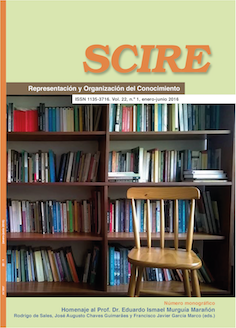The relationship between power and knowledge in knowledge representation and organization
DOI:
https://doi.org/10.54886/scire.v22i1.4296Keywords:
Information Science, Knowledge Organization, Murguía Marañón, Ismael Eduardo, Knowlege-Power Theory, Epistemology, Colections, ColeccionismoAbstract
This paper addresses aspects of researcher and professor Eduardo Ismael Murguia’s trajectory, through his works dedicated to the relationships between knowledge and power in knowledge organization and representation. It mainly covers the last five years of his work, a period in which his preference for machinic agencements as a unit of analysis becomes more evident. It presents his materialistic phase based on the exhibition “Para que guardar?” (“Why keep/collect [things]?”), which Murguia curated and in which the problematization of the themes of collecting took on philosophical aspects. It considers that, from that exhibition on, Murguia begins new theoretical determinations to talk about objects and institutions, culminating in his post-doctoral work “Da Ciência da Informação à Cultura Material” (“From Information Science to Material Culture”). It presents the influence that Murguia absorbed by reading the works of Foucault and Deleuze, which culminated in a new way of thinking documentation in Brazil, based on the theorization between power and knowledge: the two philosophical concepts of event and agencement; of legitimate knowledge and subjected knowledge; of archeology and genealogy. The conclusion shows that Murguia’s texts about knowledge-power point to an inadequacy of scientistic and hegemonic criteria of Information Science in its discursive formation, stressing that Eduardo Ismael Murguia’s recommendation is that we should use the archeologic and genealogic processes in the analysis of our science.Downloads
Downloads
Published
How to Cite
Issue
Section
License
Copyright (c) 2016 Authors retain their copyright, but transfer the exploitation rights (reproduction, distribution, public communication and transformation) to the journal in a non-exclusive way and guarantee the right to the first publication of their work to the journal, which will be simultaneously subjected to the license CC BY-NC-ND. Authors take whole personal responsibility on fulfilling all the appropiate ethical codes and laws, and obtaining all the necessary copyright permissions regarding their articles. Institutional and self- archiving is allowed and encouraged.

This work is licensed under a Creative Commons Attribution-NonCommercial-NoDerivatives 4.0 International License.
© 1996- . Authors retain their copyright, but transfer the exploitation rights (reproduction, distribution, public communication and transformation) to the journal in a non-exclusive way and guarantee the right to the first publication of their work to the journal, which will be simultaneously subjected to the license CC BY-NC-ND. Authors take whole personal responsibility on fulfilling all the appropiate ethical codes and laws, and obtaining all the necessary copyright permissions regarding their articles. Institutional and self- archiving is allowed and encouraged.




